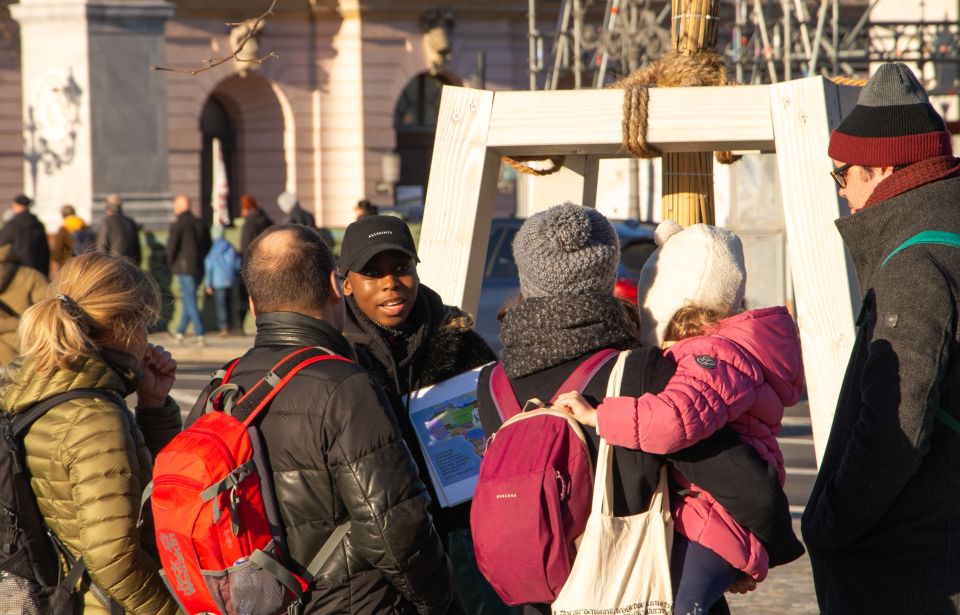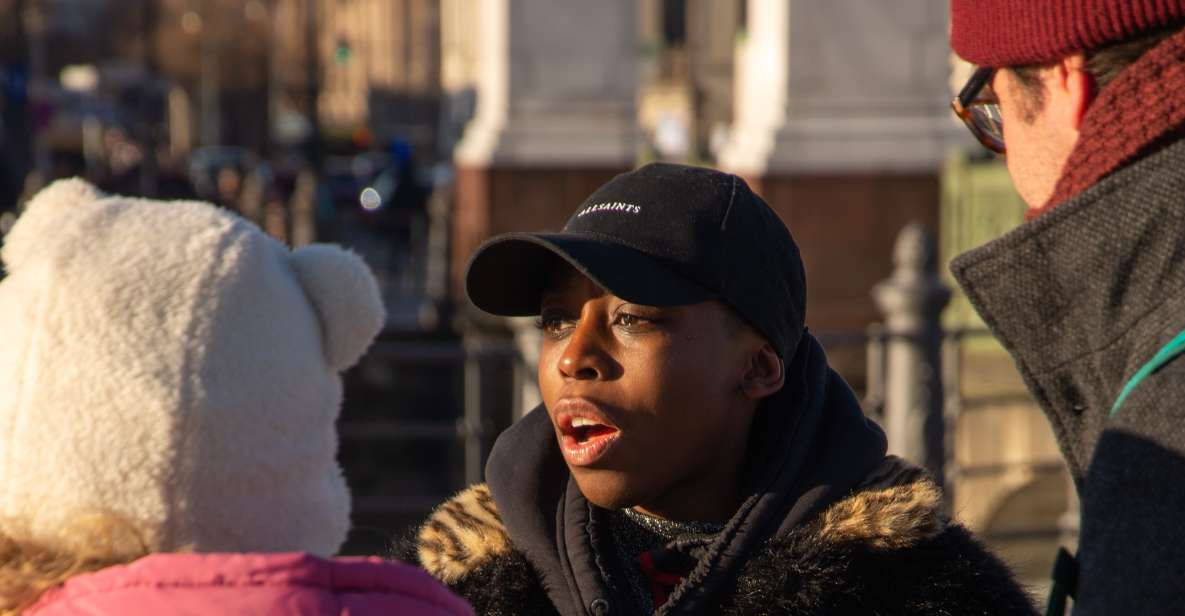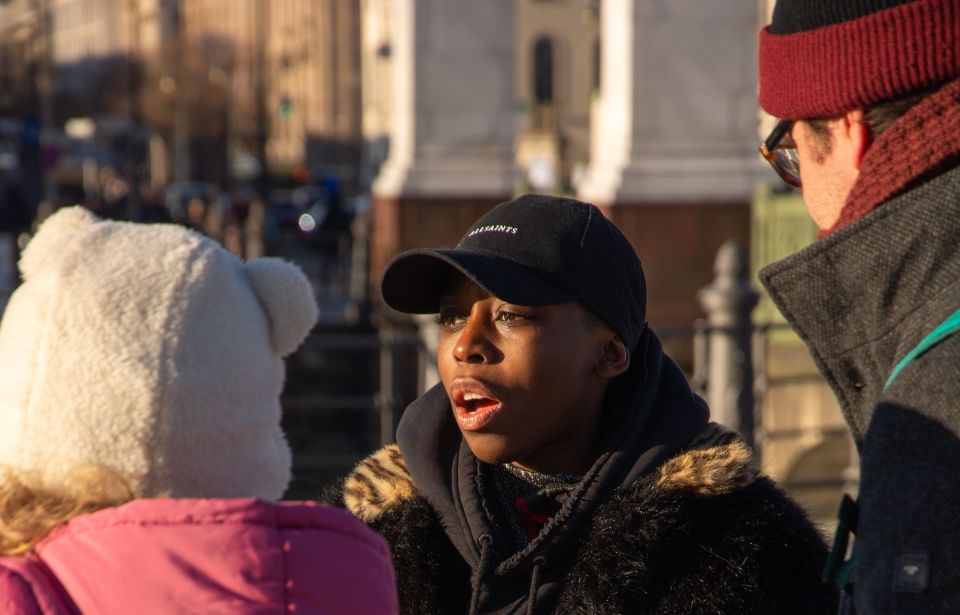If you’re interested in understanding Berlin’s history beyond the typical narrative, a decolonial perspective on the Humboldt Forum offers a fresh lens. This 2-hour guided experience aims to unpack Berlin’s colonial past, examining its impact on cultural heritage and modern identity. It’s a tour that combines history, critical analysis, and some thought-provoking insights—perfect for travelers eager to explore Berlin’s complex legacy from an Afrocentric point of view.
What we love about this experience is the knowledgeable guides who bring clarity and depth to often complex topics, and the way the tour critically engages with the ethnological collections. A potential downside? The tour’s focus on colonial critique and decolonial perspectives might feel intense or challenging if you’re not used to confronting uncomfortable historical truths. Nonetheless, it’s an important experience for those interested in cultural justice, history, and diverse narratives. This tour suits curious travelers, students, or anyone wanting a deeper understanding of Berlin’s colonial ties and their lingering effects today.
Key Points

- Afrocentric and Decolonial Focus: The tour provides a critical look at colonial history and its ongoing influence.
- Insight into Ethnological Collections: You’ll analyze exhibits from a fresh, sometimes uncomfortable, perspective.
- Historical Context of Berlin Palace: Learn why the reconstructed Berlin castle is more than just a historical building—it’s a symbol of colonial legacy.
- Engaging Guides: Expect knowledgeable guides who are adept at explaining complex issues in an accessible and engaging way.
- Flexible & Accessible: The tour is wheelchair accessible, and you can cancel up to 24 hours in advance.
- Value for Money: At $40, it offers a meaningful, 2-hour exploration into Berlin’s colonial and cultural history.
An Honest Look at the Experience

This guided tour is designed to challenge our usual understanding of Berlin’s history by incorporating a decolonial perspective. Unlike standard sightseeing tours, it encourages participants to think critically about how colonialism has shaped Berlin’s cultural institutions and architecture, particularly around the Humboldt Forum. For those who love history with a twist—questioning narratives and uncovering stories often left out—this is an eye-opening experience.
You can also read our reviews of more tours and experiences in Berlin.
The Itinerary Breakdown
The tour begins at one of two convenient meeting points, either near the reconstructed Sanchi Gate or directly in Berlin. The initial meeting outside, seated on white chairs, sets a relaxed tone before heading into the core of the discussion. After a short introduction, you’ll explore the Humboldt Forum, which is a recent reconstruction of the Berlin Palace—a site with centuries-old roots but also a modern symbol of colonial power.
The focus here is on understanding why the Berlin Palace was rebuilt and how it fits into the city’s colonial and cultural narrative. Your guide will share key facts about the Humboldt brothers—famous scientists who played a significant role in German intellectual history—and examine their legacies critically, particularly in relation to the colonial context.
Critical Analysis of Ethnological Collections
Once inside the Humboldt Forum, the tour shifts its focus to the ethnological collections. Here, you’ll browse exhibits that often draw criticism for their colonial origins. The tour provides an audio walk that prompts visitors to analyze the collection from a critical perspective—questioning how artifacts were obtained, what they represent, and the narratives they perpetuate.
One reviewer mentioned, “We loved the way the guide explained the symbolic meaning of the cross on the museum roof,” shedding light on the religious and colonial symbolism intertwined with the building’s architecture. Expect honest discussions on how museums have historically presented their collections and how modern decolonial approaches seek to reframe these narratives.
Colonialism and Missionaries
The guide also delves into the role of missionaries and their influence on colonial structures, helping visitors understand the symbolic and cultural legacies of these interactions. This context is especially important in understanding Berlin’s colonial past and its ongoing effects, which the tour invites you to critically consider.
More Great Tours NearbyReflection and Perspective Shift
Most participants appreciate the balanced yet provocative approach. A reviewer shared, “I found it absolutely disgusting how history is interpreted today, how content is given a new meaning,” highlighting that this experience can challenge preconceptions, which is its core strength.
Practical Details: What To Expect

- Duration: 2 hours, starting from a flexible time window (check availability)
- Price: $40 per person, which is quite reasonable given the depth of insight and guided expertise
- Included: Guided tour and entry to the ethnological collection
- Meeting Point: Near the reconstructed Sanchi Gate or at the specified Berlin location
- Accessibility: Wheelchair friendly, with outdoor seating before entering the museum
- What to Bring: Comfortable shoes, weather-appropriate clothing, and an open mind
Group & Atmosphere
The group is typically small enough for engaging discussion, making it ideal if you enjoy personal interaction and questions. The guide’s ability to explain complex issues clearly makes this experience suitable for both history buffs and newcomers interested in social justice.
The Value of the Experience

At $40, this tour offers solid value for a deep, meaningful exploration of Berlin’s history—something that sticks with you long after the visit. It’s not just about sightseeing but about understanding the layered stories behind Berlin’s architecture and collections. The focus on critical analysis makes it more than a typical museum visit; it’s a call to reflect on how past injustices shape present realities.
Who Will Appreciate This Tour?
This experience is best suited for travelers who are curious about colonial histories, want to question traditional narratives, or seek a more thought-provoking cultural experience. It’s particularly fitting for students, educators, or anyone interested in cultural justice and decolonization.
The Sum Up
This Berlin tour provides a thoughtful, engaging look at the city’s colonial past and its ongoing influence through a decolonial lens. It’s an accessible way to deepen your understanding of Berlin’s history, especially if you’re interested in critical discussions about cultural heritage and historical narratives.
While it might be challenging for those expecting a light sightseeing experience, it rewards participants with authentic insights and a fresh perspective on a city that has long been a crossroads of history, culture, and power. The knowledgeable guides, critical approach, and focus on cultural justice make it a worthwhile addition to your Berlin itinerary—especially if you want to leave with a more nuanced view of this vibrant city.
FAQ
Is this tour suitable for all ages?
While primarily aimed at adults interested in history and social issues, the tour’s content might be intense for very young children. It’s best for older teens and adults who can engage with complex ideas.
How long does the tour last?
The tour runs for approximately 2 hours, making it a manageable but impactful experience.
Can I cancel the tour if my plans change?
Yes, you can cancel up to 24 hours in advance for a full refund—offering flexibility for your travel schedule.
Is the tour wheelchair accessible?
Yes, the tour is wheelchair accessible, with outdoor seating available before entering the museum.
What should I wear?
Wear comfortable shoes and dress for the weather, as some parts of the tour involve outdoor seating and walking.
Do I need to pay in advance?
You can reserve your spot now and pay later, which helps keep your plans flexible.
This guided experience offers a meaningful way to see Berlin through a critical, Afrocentric lens—perfect for those eager to understand the city’s colonial ties and challenge conventional histories. It’s an enriching journey that leaves you with more questions and new perspectives—an essential addition to any culturally curious traveler’s list.
You can check availability for your dates here:More Guided Tours in Berlin
- Self-drive E-Scooter shared guide in small groups
- Berlin: History of the Third Reich Guided Walking Tour
- Berlin: Guided Street Food Tour with Tastings
- Potsdam: Guided Private Car Tour from Berlin
- Berlin: East and West Wall Tour by Bike with a Guide
- Berlin: Guided Bike Tour to Hidden Gems off the Beaten Path
More Tours in Berlin
- Evening Boat Tour 1.5 hour with our solarcatamaran
- Berlin: History of the Third Reich Guided Walking Tour
- Potsdam: Original steam ship Gustav from 1908. Coal-fired, boat tour
- Private Rickshaw Taylor Made By Night Tour
- Potsdam & Sanssouci Gardens Private Tour With Jacob
- Köpenick Berlin: Self-Drive Boat Tour for up to 8 people
More Tour Reviews in Berlin
- Evening Boat Tour 1.5 hour with our solarcatamaran
- Self-drive E-Scooter shared guide in small groups
- Berlin: History of the Third Reich Guided Walking Tour
- Private Berlin Rickshaw- Historical Berlin Up to 6 People
- Graffiti Workshop In Mecca Of Graffiti – Berlín
- Private Rickshaw Berlin Highlights and secrets up-to 6 Pers.
Not for you? Here's more nearby things to do in Berlin we have reviewed
- Evening Boat Tour 1.5 hour with our solarcatamaran
- Self-drive E-Scooter shared guide in small groups
- Berlin: History of the Third Reich Guided Walking Tour
- Private Berlin Rickshaw- Historical Berlin Up to 6 People
- Graffiti Workshop In Mecca Of Graffiti – Berlín
- Private Rickshaw Berlin Highlights and secrets up-to 6 Pers.
- Creative Portraits in Berlins Streets
- Potsdam: Original steam ship Gustav from 1908. Coal-fired, boat tour
- Red Berlin: Secrets of the Communist Capital
- Private Rickshaw Taylor Made By Night Tour
- Potsdam & Sanssouci Gardens Private Tour With Jacob
- Quatsch Comedy Club Berlin: Die Live Show Entry Ticket
